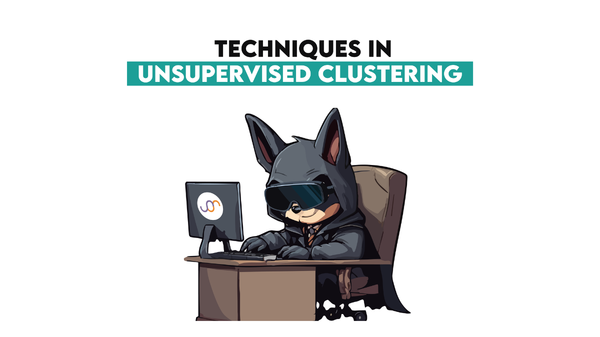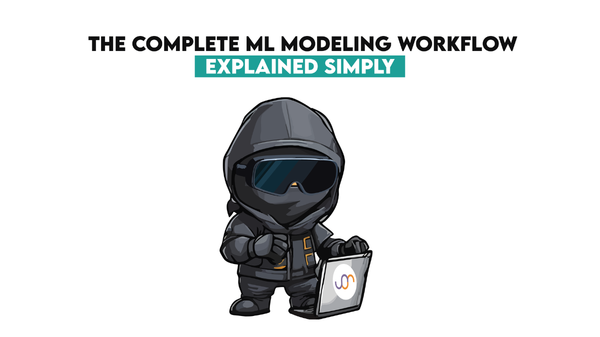A Comprehensive Review of Online Platforms for SQL Practice
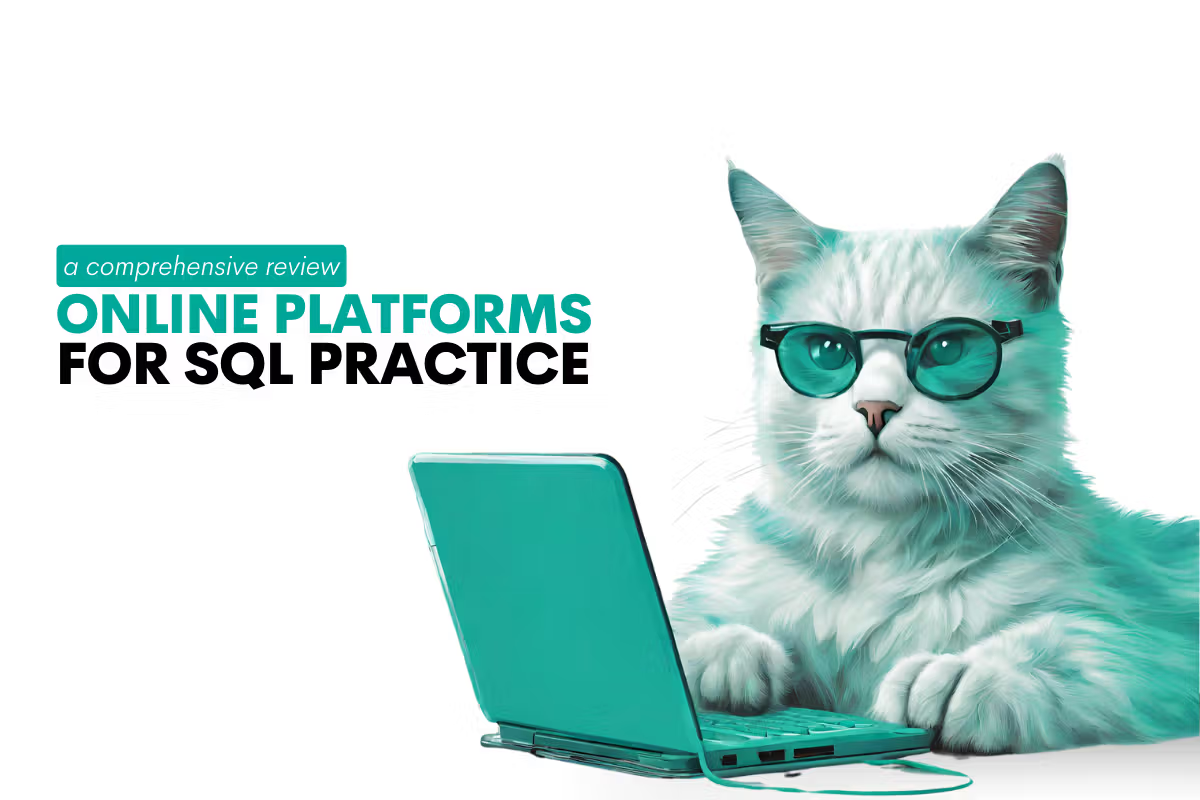
 Written by:
Written by:Nathan Rosidi
This article will give you directions on how to practice SQL online. We talk about the best SQL platforms and practices you should apply when learning online.
SQL is THE language for any data professional. The importance of data in decision-making has sky-rocketed in recent years, and the words ‘database’ and ‘big data’ have entered the everyday parlance.
With all these companies and institutions wanting to make data-informed decisions, the need for data professionals who could ‘talk’ to databases and make sense of data significantly increased. In other words, the demand for SQL experts increased, as SQL is a language specifically designed for communicating with databases and data stored there.
This has led to the emergence of numerous platforms, making it possible to practice SQL online.
This article provides a comprehensive review of the best such platforms, highlighting their features, benefits, and how they compare against each other.
Importance of Practicing SQL Online
The popularity of these platforms is not only based on the fact that you can practice SQL online but also that you can do it online. The surge of online learning is not without reason, as it offers several significant advantages compared to traditional learning.
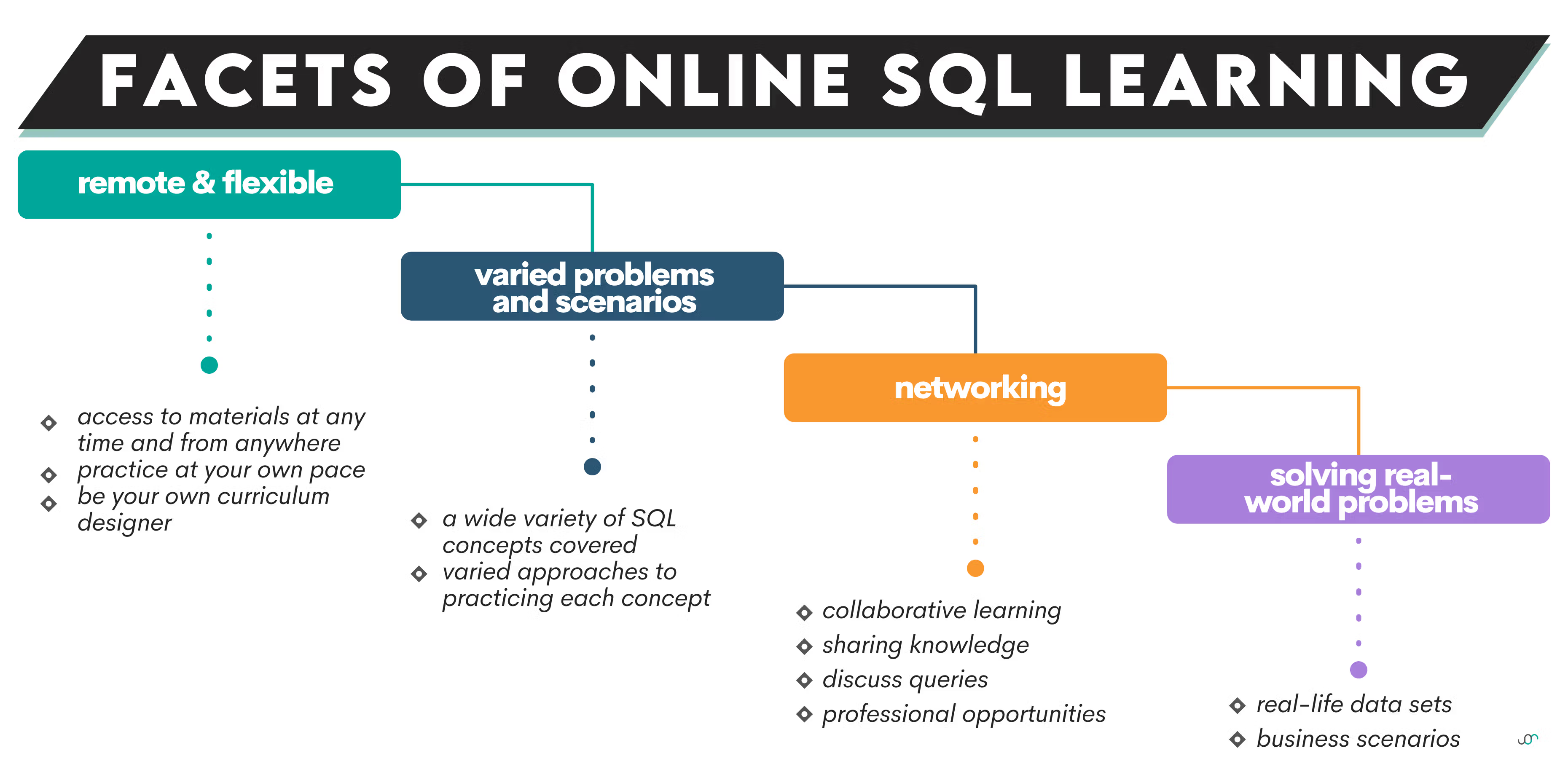
1. Remote & Flexible Learning
The foremost advantage of online SQL practice is its flexibility and convenience. You can access materials and exercises anytime and anywhere. The only thing you need is a computer and an internet connection.
You can practice SQL online whenever you want, at your own pace, and focus on the SQL concepts you want to focus on. You’re your own curriculum designer.
This flexibility in practicing SQL online is particularly beneficial for working professionals and students juggling multiple responsibilities. Online practice allows you to practice between lectures, early in the morning before you kick off your working day, or in the wee hours when everybody’s asleep, including your kid.
In other words, everybody can tailor their learning schedule around their commitments, making it possible to learn at their own pace without compromising the quality of education.
2. Access to Varied Problems and Scenarios
SQL is a diverse language with applications ranging from simple data retrieval to complex database management and analysis. Online platforms provide an extensive range of problems and scenarios that cover various aspects and complexities of SQL. This exposure is crucial for learners to understand the breadth and depth of SQL applications.
The variety is seen in the number of SQL concepts covered. But there’s also a variety of ways how these concepts are tested. The number of exercises is less significant than the variety.
There is no point in testing one concept in, say, 50 exercises if each exercise is a mild variation of the original one. You can’t learn anything if only the first exercise challenges you, and the other 49 you can solve by mindlessly writing almost the same code as in the first exercise.
Fewer but more diverse exercises that test broader applications of one concept are much better.
Ideally, of course, you’ll have many widely varied exercises to choose from.
The variety, when you practice SQL online, keeps the learning process engaging and ensures a comprehensive understanding of the language.
3. Networking with a Community of Learners
On the face of it, practicing SQL online means learning in isolation. This can be challenging, especially when dealing with complex SQL queries and data problems. This seems like a drawback of the flexibility online learning offers. In the classic classroom, you have tutors and fellow students.
But who says there are no such things in online learning? Online platforms often have a ‘Discussion’ or ‘Community’ section. These communities are invaluable for collaborative learning, sharing knowledge, and seeking solutions to common problems. They provide a platform for learners to discuss queries, share insights, and even network for professional opportunities.
This communal aspect of learning fosters a sense of belonging and motivation, often leading to a more enriching learning experience.
4. Getting Accustomed to Real-world Problems
This advantage of online learning is connected with the second benefit of accessing varied problems and scenarios. The ability to apply SQL to real-world scenarios is one of the critical aspects of learning SQL. This language and databases don’t exist in some parallel universe to the real world. The whole point of inventing SQL was to make handling data and using it in a meaningful way possible.
Online platforms bridge the gap between theoretical knowledge and practical application by providing exercises and problems sourced from real-life data sets and business scenarios. This exposure is crucial for you. Why? You need to understand how SQL is used in actual business contexts. This prepares you as well as possible for the challenges you will face in your professional roles. Ideally, online learning platforms will allow you to get a data professional job and make the transition from learner to SQL practitioner as smooth as possible.
By solving these real-world problems while you practice SQL online, you can gain insights into how data management and analysis are conducted in industries, making you better equipped for your career.
Key Features to Look For in an Online SQL Practice Platform
It would be great if you had time and money to solve all the exercises on all the online platforms. But it’s impossible to do that. And pointless, really.
Of course, you’ll look at some of the platforms I recommend and choose the one you like. While the decision is always yours, I recommend considering these five key features when looking for an online SQL practice platform.
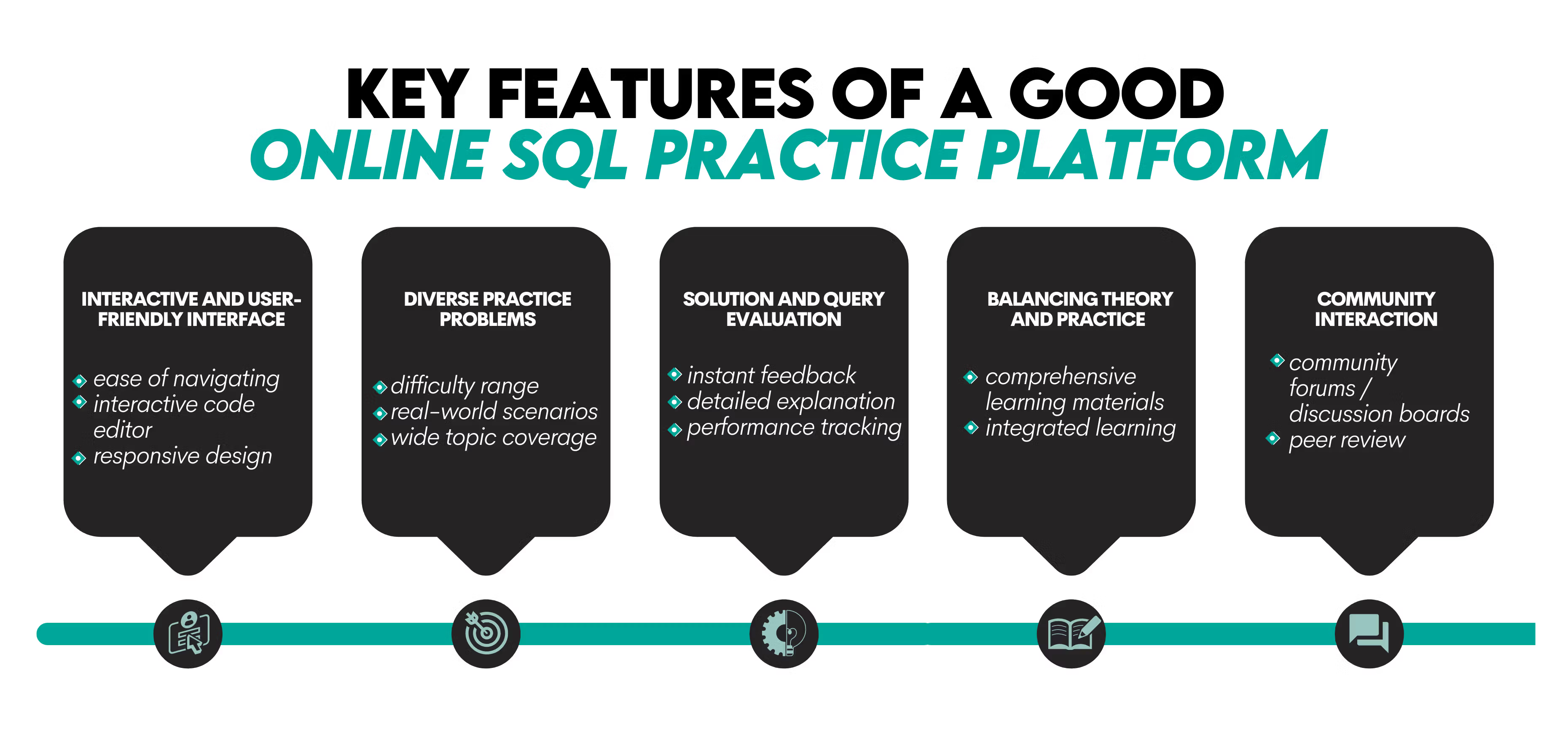
1. Interactive and User-Friendly Interface
The interface of an online SQL platform plays a crucial role in the learning experience. Think of it as your classroom. The classroom should be well-lit, not too cold or warm, with comfortable ergonomic chairs, plenty of leg room, and more. All these features are there to enhance your learning experience.
The same is true with the online platform interface. A well-designed, interactive interface can greatly reduce the learning curve for beginners and keep users engaged. Key aspects include:
- Ease of Navigation: The platform should allow users to easily find and access different modules, problems, and resources.
- Interactive Code Editor: A good platform will have a code editor where users can write, test, and debug their SQL queries. Features like syntax highlighting, error display, and auto-complete can be particularly helpful.
- Responsive Design: Given that users might access the platform from various operating systems and devices, including tablets and smartphones, a responsive design ensures a seamless experience across all devices.
2. Diverse Range of Practice Problems
The variety and quality of practice problems available are critical for the reasons I already explained earlier. A good platform should offer:
- Range of Difficulty: Problems should cater to all skill levels, from beginners to advanced users.
- Real-World Scenarios: Including problems that mimic real-world scenarios helps learners understand how SQL is applied in practical situations.
- Topic Coverage: The platform should cover a wide range of topics, from basic data retrieval to complex data manipulation and analysis. Any respectable platform should have you covered on these SQL concepts:
- SELECT statements
- Filtering data using WHERE
- Aggregate functions, GROUP BY and HAVING
- JOINs
- Subqueries & CTEs
- Window functions
- SQL functions
3. Solution and Query Evaluation
Getting feedback on your code is essential in online learning. An effective SQL platform should provide:
1. Instant Feedback: The platform should be able to evaluate queries and provide instant feedback, helping learners immediately understand their mistakes. In other words, your solution should be run against the official solution and marked as correct or incorrect.
2. Detailed Explanations: The correct solution doesn’t necessarily mean that your code is exactly the same as the official one. Usually, there’s more than one way of solving a particular exercise; this is the beauty of SQL. So, the correct answer returns precisely the same output the exercise requires.
The best platforms will show you more than one way of solving the problem, evaluate the efficiency of your solution, and explain why a different approach might be preferred. These explanations can come in the form of textual elaboration of the solution or a video showing how to solve the problem.
3. Performance Tracking: The ability to track progress over time can be motivating and informative for learners. Your performance can be tracked in several ways.
- Progress Dashboards: They give a visual overview of your progress, showing your completion rates, module progression, and streaks and milestones.
- Quiz and Exercise Scores: After completing quizzes or practice exercises, learners often receive scores or grades. These can be particularly useful in assessing understanding and tracking your improvement.
- Skill Assessment: Some platforms periodically assess learners' skills through more comprehensive tests or projects. These assessments can help you benchmark your skills and identify your strengths and weaknesses.
- Badges and Certifications: Gamification elements like badges or certifications upon completing certain levels or challenges can also be a form of performance tracking. They motivate you to continue learning and recognize your achievements.
- Personalized Reports: Some platforms generate personalized reports that detail time you spent on different topics/types of exercises and your learning patterns, such as most active times, frequency of practice, etc.
- Leaderboards: Some platforms have a competitive edge, with leaderboards showing how you rank compared to others and encouraging interaction with other learners.
- Goal Setting and Tracking: The ability to set your goals and track progress towards these goals can also be highly motivating.
4. Theory and Practical Balance
Yes, it’s true; the best way of learning SQL is through practice. In other words, by writing more code lines than you can count. But you can’t immediately jump to coding; you need to have some theoretical background to know what SQL concept to use in your code and how.
Ideally, the platform will balance the theory and practice through:
- Comprehensive Learning Materials: The tutorials, guides, and resources should explain SQL concepts and syntax, allowing you to start coding on your own slowly.
- Integrated Learning: The platform should integrate theoretical concepts with practical exercises, allowing learners to apply what they learn immediately.
5. Peer Interaction and Forum
The benefits of social learning shouldn’t be underestimated, as they can greatly enhance the effectiveness of your learning.
Try to look for platforms that offer:
- Active Community Forums: A platform with an active community forum allows learners to ask questions, share knowledge, and learn from others’ experiences. There’s a self-fulfilling prophecy: the more popular platform, the bigger community; the bigger community, the more popular platform.
- Peer Review and Collaboration: Some platforms offer peer review systems or collaborative projects, which can be a great way to learn from and with others.
Best Platforms to Practice SQL Online
After all the introduction and conceptual talk, it’s time to get specific. I’ll give you an overview of nine online platforms for learning SQL that satisfy all or most of the criteria I mentioned above.
1. HackerRank

HackerRank offers a wide range of coding challenges, including SQL. This makes it ideal for those preparing for technical job interviews. Its competitive environment and community discussions are great for learners who thrive in a challenge-driven setting.
Known For
- Diverse Challenges: Offers a wide range of SQL challenges, from basic to advanced levels, suitable for both beginners and experienced users. You can filter them by skill level, challenge difficulty, and SQL topics.
- Interview Preparation: Particularly strong in preparing users for technical job interviews with its coding challenges.
- User Interface: Clean and intuitive, making it easy to write, test, and submit SQL queries. The code editor allows you to write code in DB2, MySQL, Oracle, and MS SQL Server dialects.
- Community and Leaderboards: A large community of 21 million developers and competitive leaderboards for an engaging learning experience.
Best for: Those preparing for job interviews and coders who enjoy a competitive, challenge-based learning environment.
2. SQLPad

SQLPad is a user-friendly platform perfect for beginners, focusing on basic to intermediate SQL concepts with an interactive SQL editor and real-time feedback.
Known For
- Interactive Learning Environment: Provides an interactive SQL editor for practicing queries in PostgreSQL and MySQL flavors.
- Beginner-Friendly: Focuses on basic to intermediate SQL concepts, making it ideal for beginners.
- Real-time Feedback: Offers instant feedback on queries, which is crucial for learning and correcting mistakes on the spot.
Best for: Beginners and those who prefer a straightforward, no-frills platform for SQL practice.
3. StrataScratch

StrataScratch specializes in offering real-world SQL problems sourced from top companies, making it excellent for practical learning and interview preparation.
Features
- Real-World Problems: Offers 1,000+ real interview problems sourced from actual companies, giving users a taste of the SQL queries they might encounter in a professional setting.
- Interactive Learning Environment: There’s an interactive learning environment that offers hints to the solution and the expected output. The code editor allows you to write the code in PostgreSQL, MySQL, MS SQL Server, and Oracle and immediately check your code against the official solution. Many questions also have video solutions to guide you through.
- Interview Preparation: Includes interview-specific questions you can filter by company, industry, topics, and difficulty, which is great for job-seekers.
- Community Solutions: Allows users to share and see solutions provided by others, offering diverse perspectives on problem-solving.
Best for: Learners who want to focus on real-world applications and those preparing for data-related job interviews.
4. LeetCode

LeetCode is known for its extensive problem set, including a robust collection of SQL challenges, catering primarily to those preparing for technical interviews and offering a vibrant community forum.
Known For
- Extensive Problem Set: Known for its vast array of hundreds of problems, including a robust set of SQL challenges.
- Interview Focus: Many problems are geared toward interview preparation, as they have interviews from actual companies.
- Community Insights: Offers a strong community forum where users can discuss problems and solutions.
Best for: Users looking for a comprehensive range of problems and those preparing for technical interviews.
5. Mode

Mode combines SQL tutorials with real-world data sets, allowing learners to apply SQL in practical business contexts, making it suitable for those interested in data analytics and business intelligence.
Features
- Real-World Data Sets: Provides practice problems based on real-world data sets, which is excellent for practical learning.
- SQL Tutorials: Offers theory tutorials alongside practice problems, making it a good platform for beginners. The tutorials are divided into basic, intermediate, and advanced SQL topics and SQL analytics training.
- Mode Analytics Integration: Unique feature where users can explore actual business data and build reports.
Best for: Learners interested in applying SQL in real business contexts and those who appreciate learning through tutorials.
6. SQLZoo

SQLZoo provides interactive SQL tutorials and exercises with immediate feedback, ideal for beginners and those who prefer a more guided learning approach.
Known For
- Interactive Tutorials: Offers a range of interactive SQL tutorials and references by topic, along with exercises and assessments where you can test your understanding.
- Immediate Feedback: You get instant feedback on your queries, which is helpful for learning.
- Variety of SQL Dialects: Covers different SQL dialects – such as MySQL, Oracle, MS SQL Server, DB2, PostgreSQL, and Ingres – providing a broad learning experience.
Best for: Beginners and those who prefer a more guided, tutorial-based approach to learning SQL.
7. W3Schools

W3Schools offers comprehensive, easy-to-understand tutorials on SQL and a range of other web technologies, complemented by a "Try-it-Yourself" editor, perfect for beginners seeking a structured learning path.
Known For
- Comprehensive Tutorials: Known for its extensive and easy-to-understand tutorials in a wide range of SQL dialects, such as MySQL, MS SQL Server, MS Access, Oracle, Sybase, Informix, and PostgreSQL.
- Try-it-Yourself Editor: Offers an online editor where users can practice SQL commands and see the results instantly.
- Structured Learning Path: Provides a structured approach to learning, making it ideal for absolute beginners. It also has a great reference section, with a short explanation of basically all the important functions in several SQL databases.
- Certification: The platform also offers the possibility to take an SQL certification exam, which could increase your employability.
8. DataCamp
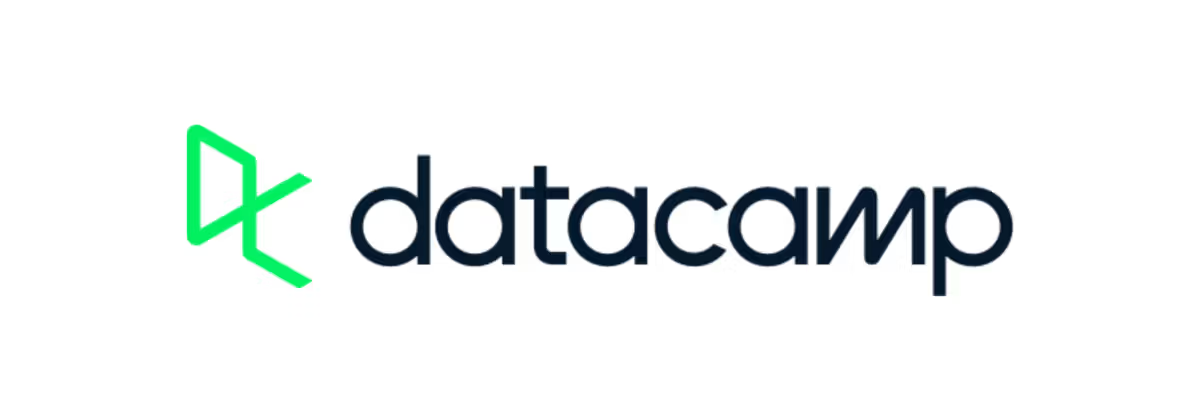
DataCamp offers interactive courses in SQL and data science, with a mix of video tutorials and hands-on exercises, ideal for those aiming for a data science or analytics career.
Known For
- Interactive Courses: Offers interactive courses with a mix of video tutorials and hands-on exercises. The courses are divided into difficulty levels, topics (e.g., Data Analysis, Programming, etc.), and technologies.
- Career Tracks: Provides guided learning paths for different data science careers and skills.
- Skill Assessments: Includes skill assessments to help users track their progress and identify areas for improvement.
Best for: Those looking to build a career in data science or analytics and prefer a structured, course-based learning approach.
9. SQLBolt

SQLBolt provides straightforward, interactive lessons and exercises designed to teach SQL basics, offering immediate feedback in a simple, clean interface that is great for beginners.
Known For
- Interactive Lessons: Provides a series of interactive lessons and exercises divided into SQL topics designed to teach SQL from the ground up.
- Instant Feedback: Offers immediate feedback on exercises, which is excellent for learning and correction.
- Simple and Clean Interface: The interface is straightforward, focusing solely on SQL without any distractions.
Best for: Beginners who want a simple and direct approach to learning SQL basics.
Comparative Analysis of Top Platforms for Practicing SQL Online
Now that you know all platforms let’s directly compare them based on the key features you should be looking for.
- Interface
- Problem Diversity
- Query Evaluation
- Theory & Practice Balance
- Community Support
I’ll first show you a descriptive comparison, which lets you decide which platform suits you the best.Then, I’ll try to evaluate each platform on these criteria. Mind you, it doesn’t involve any objective scientific method. It’s based on my personal aesthetic and learning style preferences. If you want me to impose my preferences on you, you’ll have it there.
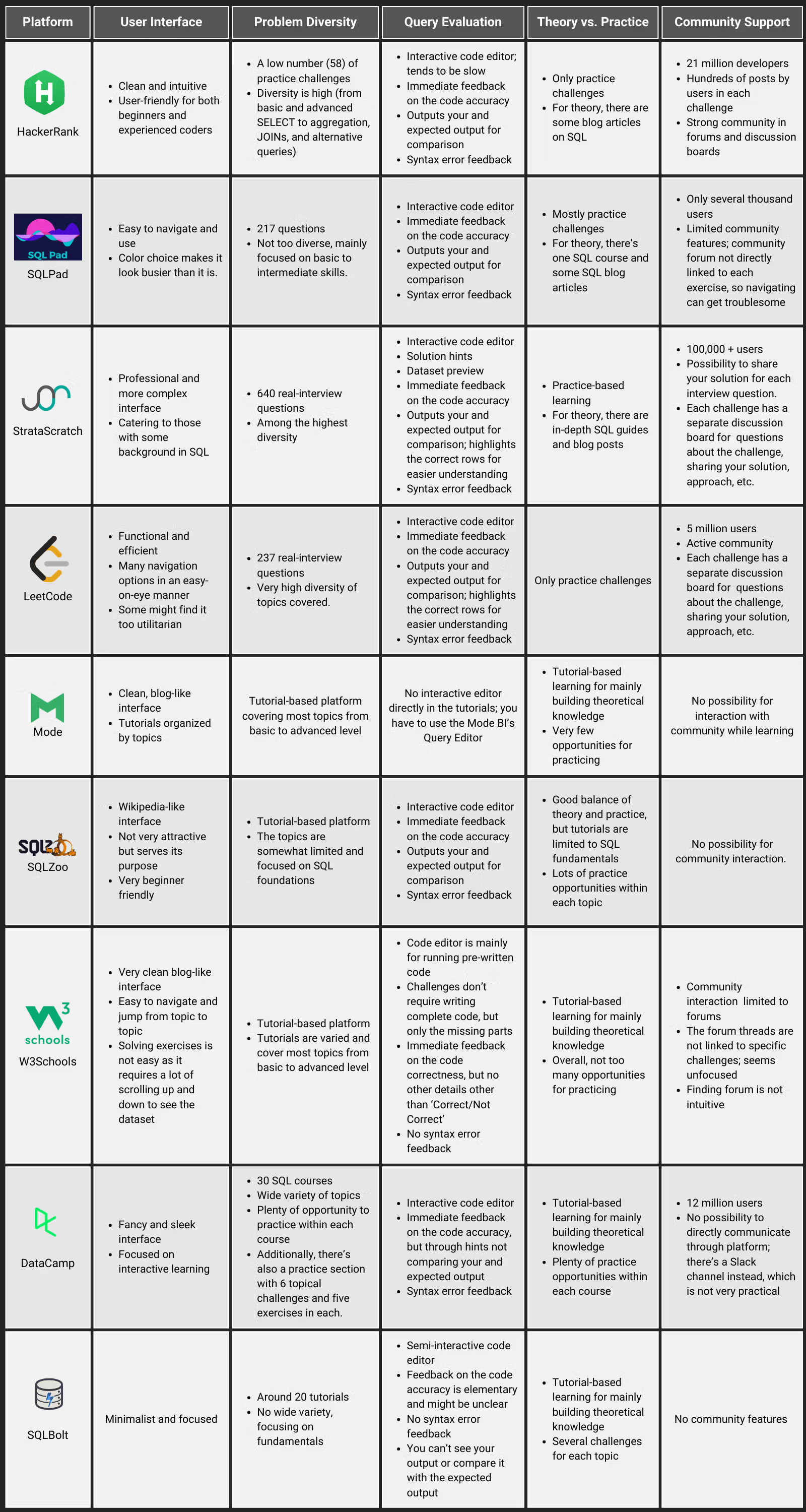
Grading the Features
Let me now turn the above info into an at-a-glance overview and grade the features for each platform. Mind you, it's a completely non-scientific approach, all with emojis and everything!
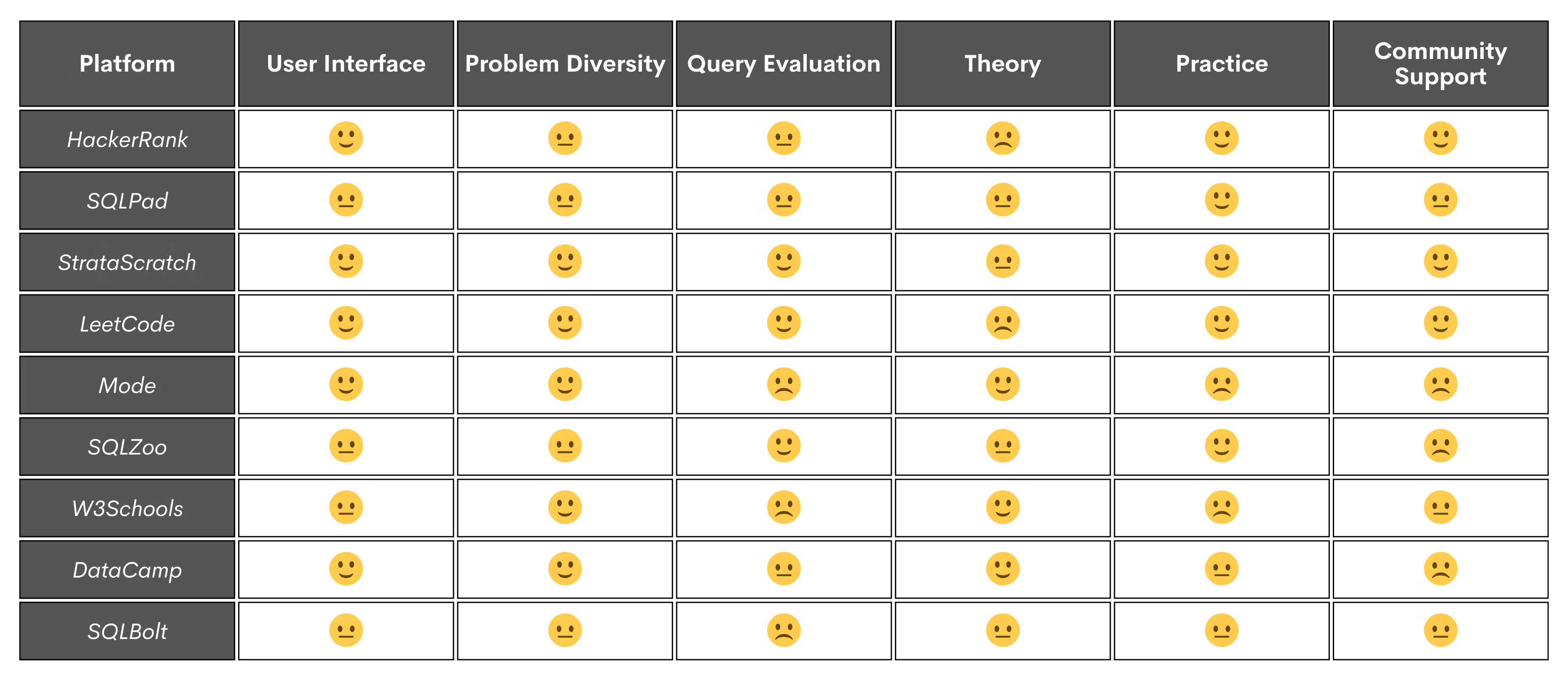
Pricing Overview
I can talk about the features all I want, but I’m realistic: price is a criteria on its own. I gave you a feature overview, showing you what each platform offers, regardless of price.
With the following pricing overview, you can add price into the mix and find the platform that you think will give you the best value for money.

Tips to Maximize Learning on Online SQL Platforms
To make the most of online SQL platforms, it's crucial to approach your learning journey strategically. Here are some tips on how to do it.
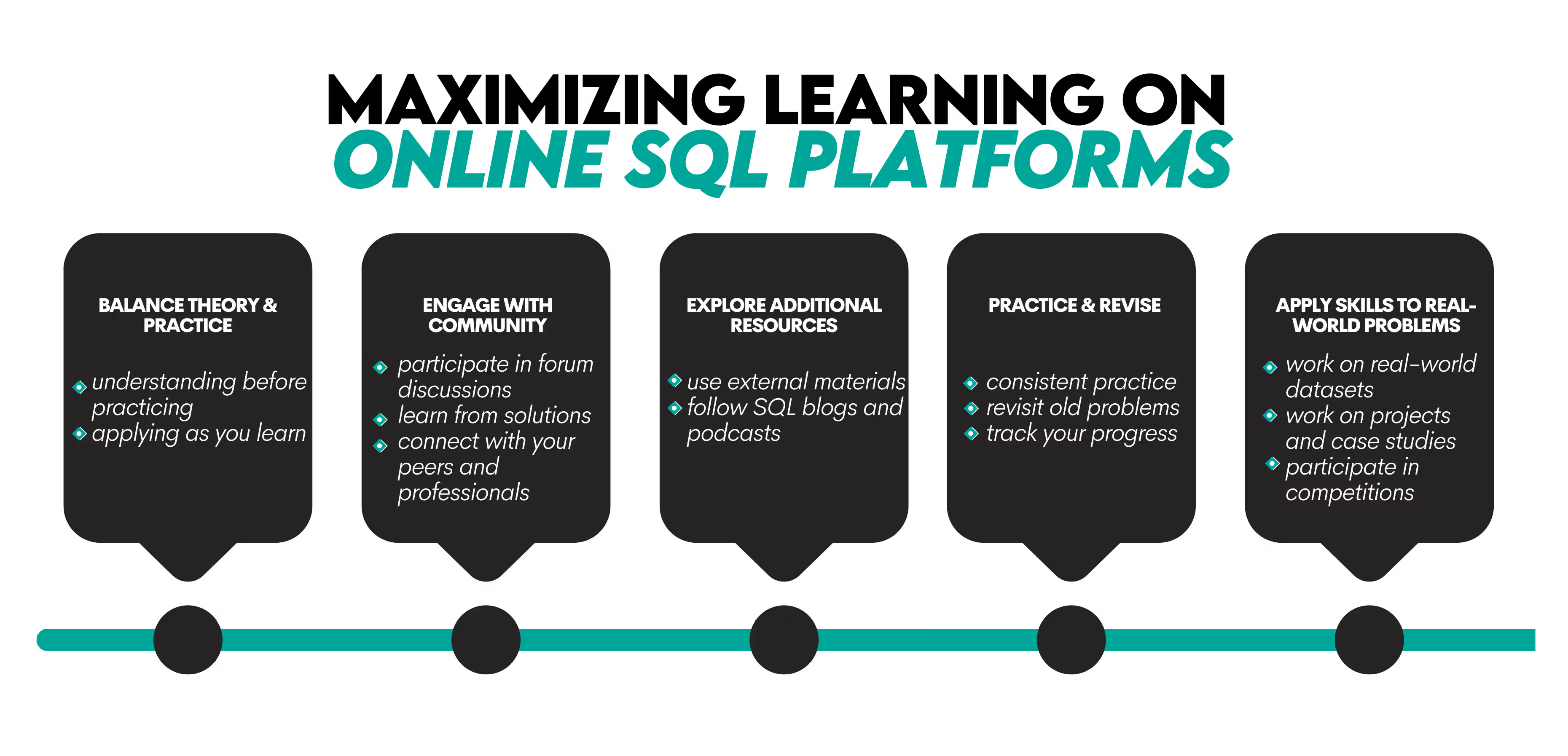
1. Balancing Theory and Practice
I already mentioned the importance of balancing between theory and practice for full SQL mastery. Coding without having a general picture of how certain SQL concepts work is never a good idea; you should know what you’re trying to achieve with your code.
The opposite approach – learning theory without ever writing a single line of an SQL code – also won’t work. Knowing SQL implies you know how to code in SQL. And if you don’t, what’s the point of your excellent theoretical knowledge?
So, when you learn SQL online, involve these two approaches in your strategy.
- Understand Before Practicing: Before diving into solving problems, ensure you have a good grasp of the underlying SQL theory.
- Apply As You Learn: After learning a new concept, immediately apply it to a practical problem.
2. Engaging With Community
Knowledge doesn’t only come from the platform itself, its tutorials, or challenges. It also comes from people who are learning SQL, just like you. They all have different paths, levels of experience and knowledge. A lot of them will know SQL better than you. You can compound your learning by learning from them and sharing your knowledge.
There are several ways to engage with the platform community.
- Participate in Forums: Some platforms have active community forums. Engage in these forums to ask questions, share your solutions, and learn from others.
- Learn from Solutions: Some platforms allow you to share your solutions and review others’. There’s usually no one correct way to get the expected results, so you can learn a lot from others solutions and try their approaches.
- Networking: Aside from learning SQL, you can also use these platforms to connect with peers and professionals. This network can be invaluable for career growth.
3. Exploring Additional Resources
While most platforms offer comprehensive materials, it doesn’t mean you’re not allowed to look for other learning resources. So:
- Supplement With External Materials: Don’t limit yourself to one platform. Supplement your learning with additional resources like books, blogs, or online tutorials.
- Follow SQL Blogs and Podcasts: Stay updated with the latest trends and best practices in SQL by following relevant blogs (some platforms also have a blog section), podcasts, and industry leaders.
4. Regular Practice and Revision
The thing with SQL coding is that you have to maintain the form, as in everything. Not writing SQL code can lead to forgetting (or taking a long time) how to solve a certain problem. To avoid that, you need to:
- Practice Consistently: Regular coding is critical. Unless your job asks you to write SQL code for several hours daily, you need to organize practice yourself. Set aside dedicated time each day or week for it.
- Revisit Old Problems: Periodically revisit problems you found challenging. This helps reinforce learning and understand concepts more deeply.
- Track Your Progress: Use the performance tracking features that some platforms offer to monitor your progress and identify areas for improvement.
5. Applying Skills to Real-World Problems
Most people learn SQL because their job requires it or they want to find a more exciting or better-paying job. In other words, they are or will be required to use SQL in practice. They’ll use it to solve the real-world problems under their job description.
To solve real-world problems, you must also apply your skills to them in the learning phase.
- Work on Real-World Datasets: Most platforms offer real-world data sets, even the actual SQL interview questions, which provide invaluable practical experience.
- Project-Based Learning: Try to work on small projects or case studies. This could involve anything from analyzing a dataset of your interest to automating a database-related task.
- Participate in Competitions: Engage in SQL competitions or hackathons available on some platforms. This not only tests your skills under pressure but also adds to your experience and resume.
Final Note: Which One Is the Best Platform for You to Practice SQL Online
These are all quality platforms for learning SQL online. It’s up to you to choose which one suits you best.
Your choice could depend on liking more or less structured learning, wanting to engage with the community, needing more or less theoretical or practical approaches, etc. But let’s not kid ourselves; the price is always a main factor. So, yes, there are several completely free platforms available.
As you probably noticed, these platforms usually offer a limited variety of topics and exercises, community features, and feedback paired with a rather rudimentary user interface. This might be good if you’re a beginner and want to get the feeling of how SQL works.
If you already have some SQL background, one of the paying platforms might be better suited for you. They are more eye-pleasing, user-friendly, and have a bigger, more active, and knowledgeable community. You also get a much wider variety of topics, video solutions, explanations, and real-life exercises that will really focus and direct your SQL knowledge.
If you use the criteria I outlined in this article, I’m sure you’ll easily find the best platform to practice SQL online.
In case you’re interested in broader topics, such as data science, here are the best data science platforms for learning online.
Share
